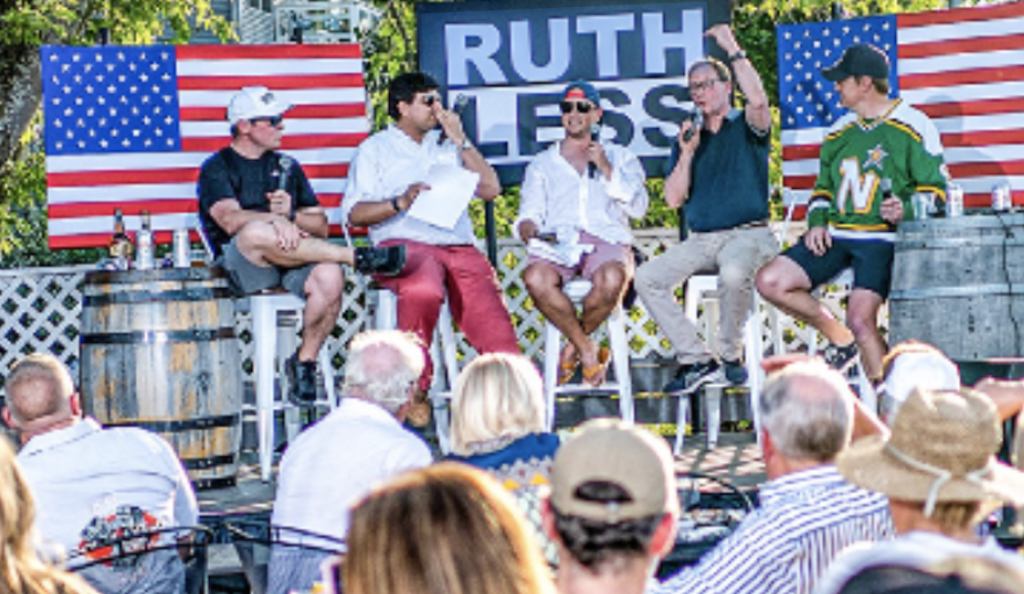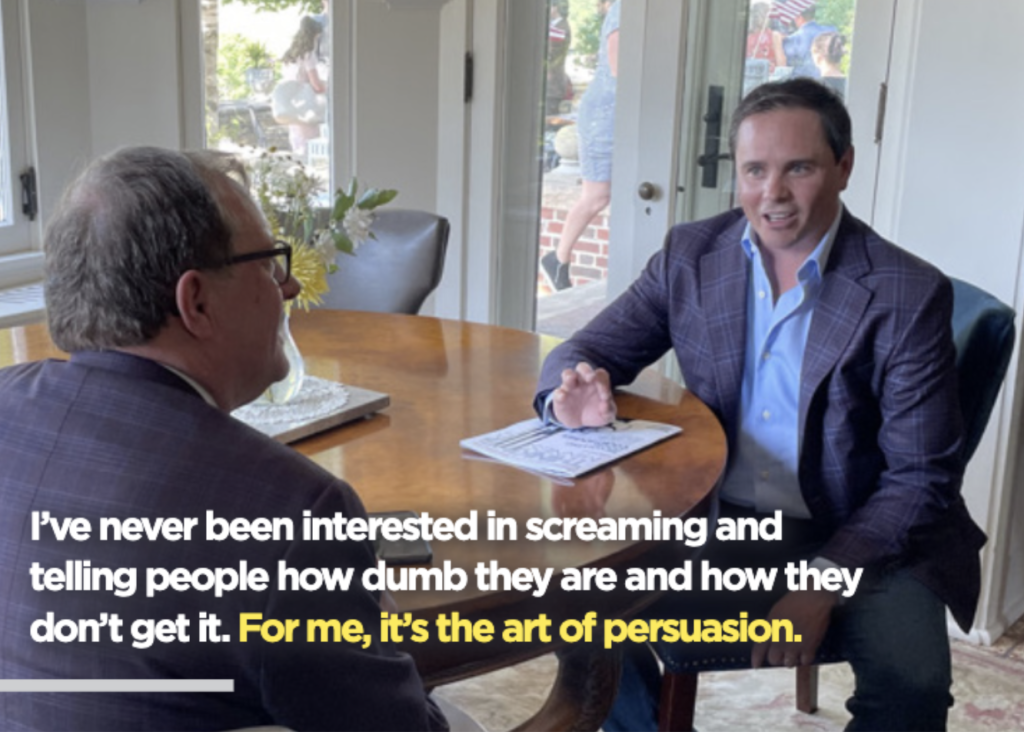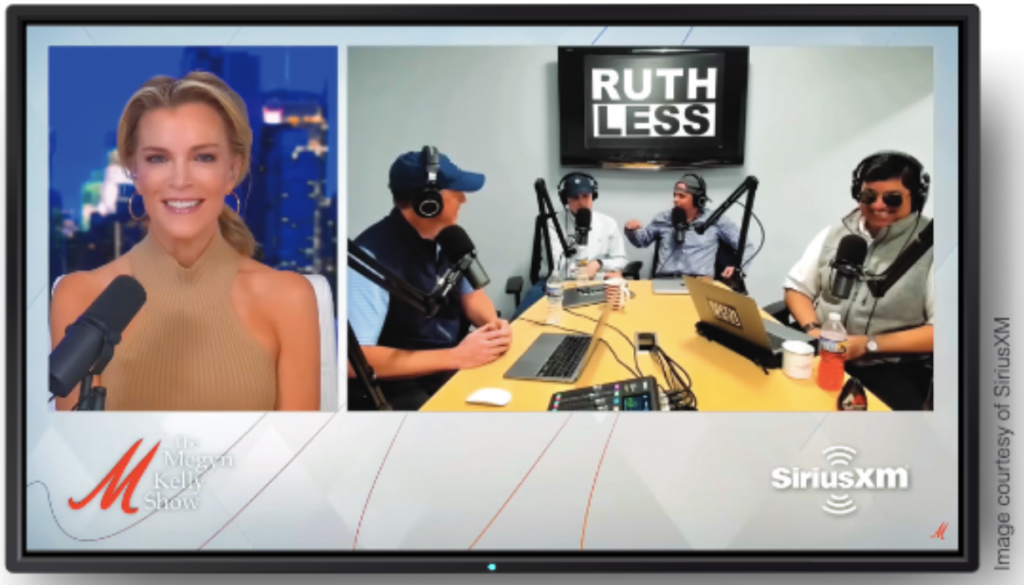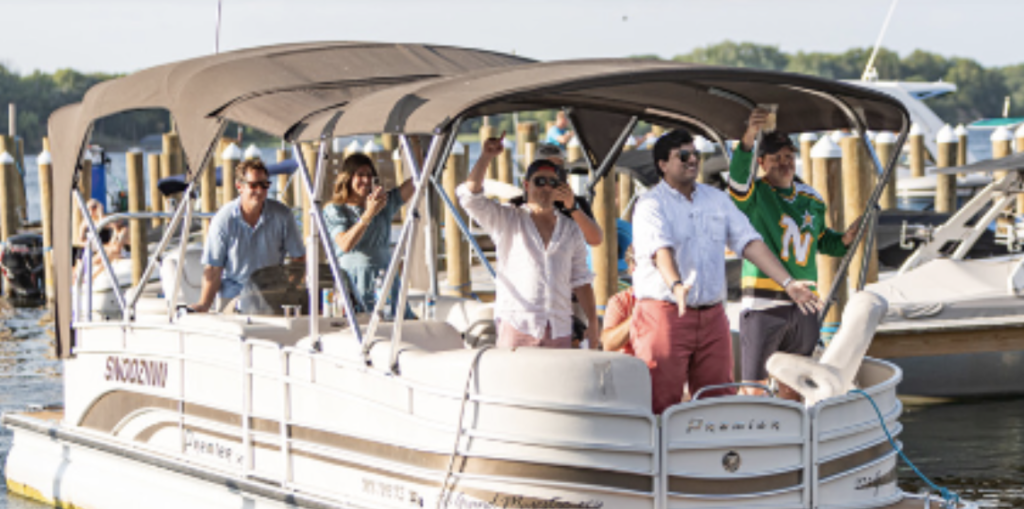Q&A: A ruthless return
Native Minnesotan Josh Holmes tells John Hinderaker about his political journey to Washington, D.C. and the unbelievable success of his podcast.
Josh Holmes is the president and founder of Cavalry, a public affairs firm specializing in issue management, digital advocacy, and strategic communications based in Washington, D.C. After starting his career on the Senate staff of Sen. Norm Coleman, he went on to serve as chief of staff and campaign manager to Sen. Mitch McConnell. He currently co-hosts the popular political podcast Ruthless, which boasts an average of five million unique listeners.
John Hinderaker: Tell us about your Minnesota roots.

Josh Holmes: Yes, Minnesota born and raised; a product of Minnetonka High School. I left to go to Arizona State and then pretty quickly made my way to D.C., but not before I came back to work on Norm Coleman’s campaign in 2002.
What did you do there?
I was a field staffer in central Minnesota. Field staffers do all kinds of things. You organize volunteers and put up yard signs. I was just doing anything I could. You break your back for the cause and see if you can get somebody’s attention to hire you — and hopefully you win. I guess it worked out, but it was really a wild ride.
Did you go to Washington with Norm?
I did. And my introduction to politics was when the incumbent Democratic senator died in a plane crash 13 days before the election and Walter Mondale being substituted. Before that, I wasn’t terribly political. My parents were very into politics. We probably spent most of our time at the dinner table talking politics. They always joked that if they had been talking about finance, I’d be a lot better off than I am today.
My real introduction to all of this was an internship that started three weeks before 9/11. It had a pretty profound impact on my view of public service and how I could make a difference. At that point in my life, I was struggling to figure out how I could make a difference. And of course, podcasts had not yet been invented. So, you couldn’t go down that road. Have you been in Washington ever since you went out there with Coleman in 2002?
With a couple of exceptions. I went out with our old buddy, Tom Mason (editor and publisher of Thinking Minnesota), to Washington state in 2004 as a policy director on an ill-fated Senate race against Patty Murray. I was young and idealistic, and I was excited about that. I met a lot of great people and learned a lot of great lessons. But coming back to D.C., I had to figure it out. At that point I’d been in the policy side and done a little bit of speechwriting. I liked communications a lot, but basically, I would do anything that anybody would hire me to do.
You wound up in some important places. You worked for [then Senate Minority Leader] Mitch McConnell.

When I met McConnell I was literally, I’m not kidding you, three months into unemployment and this close to having to pack up from D.C. and move back home. I’d basically run out of money and the credit cards were at their limit. I got a call from an assistant of Ken Mehlman who had run President Bush’s reelection in 2004. He was now the chairman of the RNC and asked if I wanted to come in for an interview. I honestly didn’t even listen to the job description; I’d figure it out later. I was fortunate enough to get that job, but Ken ultimately was the one who introduced me to Leader McConnell right after he had been elected leader for the first time in December 2006.
What was your initial role with McConnell?
He wanted to do something brand new with communications for the Senate Republicans. He wanted a younger person who had some different ideas about modern communications. I thought I would be there for six months to help open up a communications center and then join one of the presidential campaigns.
I spent three months with McConnell and it just clicked. For the first time in my career, I felt like not only did I know what I was doing, I was bringing some level of expertise to somebody who was light years ahead everybody else in the Senate at that time. My biggest complaint about the Senate was that everyone spent their days talking about things that were never going to happen. McConnell only talked about things that were going to happen, and it clicked. And close to 10 years later, I still find myself in that orbit.
You were with McConnell how long?
When you’re with McConnell, it’s like La Cosa Nostra: You never really leave. I was with him the first day of Congress in January 2007 all the way through 2014 when I left to run his reelection and oversee the Senate Republican campaign to try to retake the majority. We thought at the time it was the last best chance he had to become majority leader. He had been minority leader for a lot of cycles at that point, and so we were all-hands-on-deck to try to win the majority in 2014.
What did you learn about McConnell in those years?
He’s extremely thoughtful and plans weeks, months, years in advance. And so, what he’s primarily focused on may not satisfy the grassroots anxiety of the day, which frustrates people, right? I think a lot of people want their Senator, their Leader, to voice the frustrations they’re feeling day-to-day. But that’s never been his style. He looks forward in order to figure out how to make real change at a moment of absolute maximum impact.
Describe your transition into consulting.
I left after the 2014 campaign. At that point, I’d been McConnell’s chief of staff for a few years during which I had the opportunity to watch how advocacy had sort of atrophied. I felt like there was a real missing link between all of the modern digital persuasion techniques and what everybody in the entire advocacy world was doing to influence conservative outcomes.
So early in 2015, I opened up a company called Cavalry with John Ashbrook, who I’d left the Senate office with to go do the campaign work. We thought we had an expertise — a niche in the marketplace. And about two years later, it seemed like everybody was doing what we were doing. So, it must have worked.
Did you consult for campaigns primarily?
No, we didn’t want to just be campaign consultants. We thought we could bring something larger to the conservative world writ large. We thought we could take advocacy to the next level, so it was primarily issues based. We still do one or two campaigns every cycle just because we love it. But it’s not our primary business. Probably about 80 percent of what we do is in the private space.
The Ruthless podcast has taken the world by storm. How did it start?
John Ashbrook, Michael Duncan, and I had all worked together. We had this incubated thought about what the Right was sorely lacking. The Left was using comedic and entertainment value in late night shows. We felt there was a gaping hole for people who would laugh at themselves and laugh at the world of politics without having to scream at you all day. I’ve never been interested in screaming and telling people how dumb they are and how they don’t get it. For me, it’s the art of persuasion. For me, there are a lot of Reaganesque qualities in being able to laugh together at things you find mutually hilarious, and then begin to explain why it is that the Right’s perspective is actually the rightperspective.
The fourth member of the Ruthless team is Comfortably Smug, who is a Twitter star. How did you get hooked up with him?

So Smug and I had operated in the same world and never met each other. Online, we basically found ourselves advocating for the same things for years. One day, out of the blue, Smug sent me a Direct Message on Twitter. He was in town and asked if I wanted to go out for a drink. I’d never met this guy. He was like my Wizard of Oz. We sat down, had a great time, and our personalities really meshed. We talked zero business, but we were just laughing and kind of had the same irreverent sense of humor about things. A week or two later, we all sat down and said, “Yeah, absolutely. Let’s do it.” We literally had the exact same idea to do the exact same thing. Then it was just a matter of how to execute the podcast.
When did Ruthless go live?
We went live in October 2020 — but the backstory of this is about coming up with a name. We settled on Ruthless because a New York Times columnist wrote that the McConnell campaigns were hilariously ruthless — you know, they’d always had humor in how they were cutting their opponents down. And we thought that was actually pretty good. Let’s just go with Ruthless. Then Ruth Bader Ginsburg dies. And so, we have this heart-to-heart not knowing if we can go with that — it’s going to be horribly controversial. And Smug says, “Yeah, that’s the point.” So, we just decided to go with it and see what happened. It was sort of a Rorschach test for the Left to see who attributes your motives based upon the name of your podcast. It got a lot of attention.
How did it become so popular, so fast?
We did zero promotion. Smug had a huge following, which was obviously extremely helpful. I was pretty well known in town in terms of being able to get guests. Tom Cotton, I think, came on our third episode. And if you have somebody on like Cotton right before an election, people tune in and listen. So, we had a lot of friends who did us some favors at the front end.
It’s become sort of a staple for conservatives to come on Ruthless. It’s a long form interview so you can tell whether guests are faking it or not. We don’t grill people with the usual questions they might hear from mainstream media. We give you the floor and we let you talk about your views, and then we ask outside-the-box questions. You can immediately tell who’s faking it. I think one reason our audience loves it is because it is the ultimate authenticity test. If you can carry a half-hour on Ruthless and be entertaining, authentic, and serious — and also have a good sense of humor — you have a pretty good chance of making it with the audience.
How big is Ruthless?
I think it’s around five million unique listeners now. To be honest, the metrics for podcasts are a bit of a black box. We know it expands exponentially each and every month, which is the only thing we really care about. We have not been doing this very long, and it’s been a pretty steep climb upwards. And honestly, we didn’t know what we were doing. We started this in the middle of COVID, and D.C. was locked down. We did our first 20, 25, 30 episodes on laptops over Zoom with a USB microphone plugged into the side.
Have you found a way to monetize it?
We have sponsored episodes. What we haven’t done is jump into the commoditized marketplace, where you sign up with platforms and they slip product ads into the middle of your podcast. In the early stages of Ruthless, we felt it would be inauthentic for us to say the message that we’re trying to sell and then be like, “Oh, and by the way, here’s a Big Mac.”
American Experiment welcomed you back to Minnesota with “Ruthless on the Lake,” a live event that we hosted.

I can’t thank you enough, because the opportunity for me to come home and do this in front of friends and family is huge. I never considered being a podcaster or being in any kind of entertainment business at all. I think a lot of the work that American Experiment has done in cultivating a grassroots network of really serious conservatives who are undaunted by the fact that it’s been close to 20 years since we’ve had a lot of success is, in a cycle like this, incredibly important. With the right movement, the right energy, the right attitude all pushing in one direction — it can happen. I’ve seen it in a lot of states.
“Ruthless on the Lake” sold out in two hours, and it was mostly young people.
Well, like I said, our audience is primarily like we were when we first got into this. We try not to sit and preach politics. We’re going to try to have fun. We’re going to pick up on observations of the world that we know you’re going to agree with if you could just get it served up in the right way. And so, people are naturally conservative. Sure. But they’re also working their first job, or they’re taking their young family to softball practice. They don’t eat, breathe, and sleep this every day like we do. And if you get something that is entertaining, they tend to respond. The thing that we like most about this audience is it’s really a community. The give and take on social media is incredible and the interaction is unbelievable.
We also have an open forum. People who are listeners to Ruthless call themselves the Minions, but they also see themselves as a community. So, when there are serious things that we bring up, they take it seriously and they want to take action. Now, they also like to have a lot of fun, which is why all those tickets sold in the first two hours.
Where do you see Ruthless going from here?
We want to try to expand both the audience and add different platforms, with print and whatnot. I don’t know that we’ll ever advertise, but I do think that we will add video components.